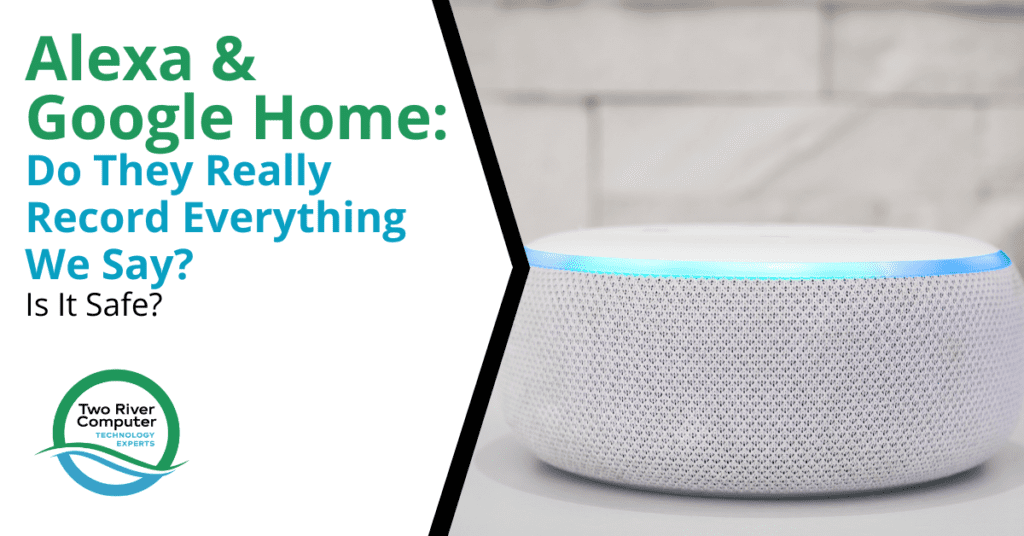
Smart voice speakers have become commonplace in homes nowadays. They connect us to instant information hands-free and help us control all our smart home devices.
Devices continue to come in several iterations, with Amazon selling an Echo for kids that has animal faces and a small version of Alexa designed to use in cars.
In 2020, the number of worldwide digital voice assistants was 4.2 billion. That’s expected to double by 2024 to 8.4 billion.
72% of smart speaker owners say they use them as part of their daily routine.
But as tools like Alexa and Google Home get smarter and more capable, are they also putting more of our personal information at risk? How safe are they?
There Have Been Several Strange Stories
Companies like Amazon and Google tend to roll things out and then “fix the bugs” as they come up from consumers. This is an unfortunate byproduct of the digital age where everything seems to move faster each year.
It often leaves security and privacy at risk.
A few of the strange events that have happened to voice speaker owners are:
- Alexa recording a conversation without being prompted and then emailing it to an acquaintance in the owner’s contact list.
- Keystroke sounds secretly being recorded.
- Alexa suddenly ending conversations by whispering “Sweet dreams,” which sounds like the basis for a new age horror story.
Privacy Concerns with Amazon & Google
Google and Amazon are not exactly known for prizing privacy. Google’s “track you everywhere” Chrome browser has caused many users to switch to a more private option.
And at the end of last year, Amazon rolled out its new Amazon Sidewalk shared neighborhood Wi-Fi, deciding to opt people in automatically to sharing a portion of their bandwidth with strangers.
The bottom line is that you can’t trust the manufacturers of these devices to always have your best interests at heart. So, you need to understand what’s happening with these “always-on” microphones and how to protect your privacy and prevent them from being used in a cyberattack against your network.
How Does the Recording Work With Smart Speakers?
With voice speakers like Alexa and Google Home, you’re inviting a microphone into your space that records conversations and stores them on a server owned by the device provider.
That data is often used to “make our services better,” which is fairly vague. The truth is that anything you say to your voice assistant can be accessed by employees at these companies or any contractors or vendors they may have agreements with.
The companies will tell you that they do not record unless you’ve activated them with the “Wake Word.” The default for Alexa is “Alexa” and the defaults for Google Home are “OK Google” and “Hey Google.”
However, many people have reported that their voice assistance has accidentally come on even if they haven’t used the wake word. This leads to private conversations being recorded that were never intended to be.
An Invitation to Hackers
Internet of Things (IoT) devices are prime targets for hackers wanting to get into a network because they tend to have fewer protections than other devices.
One vulnerability that was found in both Google and Amazon smart speakers allowed hackers to upload malicious software disguised as an Alexa skill or Google action. This malware could then allow hackers to silently record user conversations by getting the speaker to ignore the “stop” command or even ask for the password to the owner’s Google account.
How to Safely Use Your Smart Speakers
Change the Defaults During Setup
For all IoT devices, you should immediately change the default login settings and ensure you have your account protected with a strong password. This includes your Wi-Fi router.
Turn Off the Microphone When Not In Use
Both Google Home and Amazon Echo devices have a button that allows you to electronically disconnect the microphone. Turning the mic off when the device isn’t being actively used can help you avoid conversations being accidentally recorded without your knowledge.
Delete Your Voice Recordings
In answer to the privacy concerns about what was being recorded and who has access to those recordings, both Amazon and Google provide the option to delete voice recordings.
Make sure to regularly go into your settings to delete past voice recordings.
Choose What Gets Shared
If you explore your settings, you can choose what gets shared with your voice assistant. For example, Google allows you to block your voice assistance from storing your Chrome browsing history and you can also turn off things like ad personalization.
Are Your Smart Devices Properly Secured?
Two River Computer can help your family ensure your smart voice assistants and other smart home technology are properly secured, so you don’t have to worry about privacy violations or hacking.
Contact us today for a free consultation. Call 732-747-0020 or reach us online.


